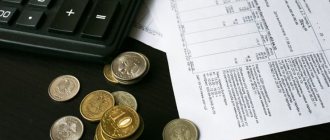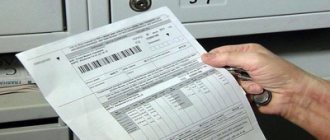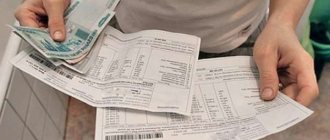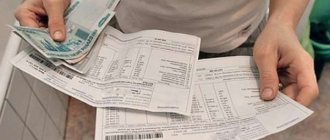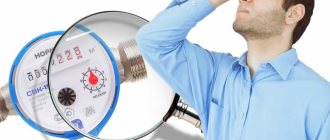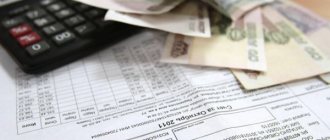Author of the article
Yulia Kuprina
Certified lawyer. Total work experience in the specialty is 13 years.
By law, the installation of IMU (individual metering devices) is mandatory when there are no design difficulties. It happens that this cannot be done objectively, for example, due to the dilapidation of water pipes.
There are no fines for missing meters. But the owner of the apartment is “punished” with increased rent. If there are no mechanical obstacles to installing an IPU, but the owner refuses to install them, then payment for used water is determined using an increased coefficient. The figure turns out to be quite impressive.
The standard water consumption per person without a meter was calculated back in the 20th century and has remained at the same level for more than 25 years. In 2021, the indicator also did not change. It may vary slightly based on the design features of the building.
Calculation of the amount of water consumption in private apartments without water meters
Provisions related to paying for water according to standards, that is, without a meter, have recently acquired legal and economic justification. In particular, the rules governing the supply of utilities, which were introduced by Government Decree No. 354 of the Russian Federation, clearly regulate the procedure for calculating payment amounts for utility services, but this act does not establish the very norm for the use of water resources by the population.
Water resource consumption rate in the absence of a meter
There is no single legislative act that would regulate the rate of water consumption for a specific person. Each subject of the Federation sets it independently
. However, this takes into account SNiP 2.04.01-85, which sets standards for the consumption of water resources. At the same time, this standard can only serve as a methodological basis for developing your own standards, but is not mandatory.
When calculating hot and cold water consumption, the following average consumption figures for one person over a certain period are used:
- filling the bath - 200 liters of water per week;
- shower use – 30 liters per day;
- water used in the toilet cistern is about 200 liters per week;
- washing dishes, washing – 200 liters per week.
Also, in 2022, the Ministry of Construction of the Russian Federation calculated how often and in what cases Russians use water, provided they live in a modern city house with all the amenities:
- taking a bath four times a month;
- using the toilet – 118 times a month;
- showering – 25 times a month;
- use of the kitchen sink – 95 times a month;
- use of a washbasin for household needs – 107 times a month.
Regional authorities set their own standards. The average water consumption standard per person without a meter across the country is determined at 6.935 cubic meters for cold water supply and 4.745 for hot water supply.
On a note! The given figures are used when calculating the quantitative water consumption of all citizens who are registered in a house or apartment, regardless of how much they actually consumed.
In accordance with the existing law, utility services can make charges to owners who do not have metering meters installed, and in excess of these standards. However, the law clearly defines that the upper limit of charges cannot exceed the size of two approved norms.
Calculation rules based on the cost of a cubic meter of water
The cost of a cubic meter of water supplied to housing varies depending on the area where water supply services are provided. It consists of several components:
- maintaining the functionality of the water supply system;
- electricity consumption;
- water purification;
- administrative expenses;
The cost of hot water, in addition, includes the cost of resources for heating it.
Rules for charges for water supply services
Below is a formula according to which the cost of water resources is calculated in premises suitable for living, provided they do not have a meter. She looks like this:
P = n*N*T
P – accrued amount;
n – number of persons registered in the premises;
N – water consumption rate adopted in a particular region;
T – water supply tariffs accepted in the region.
In addition, in order to stimulate the purchase of meters, the Government of the Russian Federation sets coefficients that increase the cost of resources, which increase the final cost of water supply services. Thus, taking into account this value, for households and apartments the calculation formula looks like this:
P = n*N*T*K
K – cost-increasing coefficient.
Who sets the tariffs
The provision of public services is subject to mandatory control and regulation by authorized government bodies. This fully applies to tariffs.
. Their cost is calculated by specialized bodies of the constituent entities of the Russian Federation, based on the current conditions of the utility services market, inflation and other reasons.
Regional standards
The standards indicated in the calculations are the average in Moscow.
In other areas you need to focus on regional values:
Table 1.
| City | Cold water, m3 | DHW, m3 |
| St. Petersburg | 4,69 | 3,4 |
| Krasnoyarsk | 5,19 | 3,68 |
| Novosibirsk | 5,19 | 3,69 |
| Ufa | 8,8 | 8,8 |
| Ekaterinburg | 5,6 | 5,04 |
Tariffs are relevant for residents of private and apartment buildings, subject to connection to central water supply pipes. This assumes the use of a full set of plumbing fixtures.
The regional indicator may vary depending on which management company the contract is concluded with. Tariffs of Vodokanal and individual HOAs may differ slightly.
Cost of water without a meter in 2022
Russia has not adopted uniform tariffs for the water supply resources used. They are installed by each region independently.
The norm for cold water consumption per person per month without a meter is not the final value when making calculations.
In apartments, houses and other premises used for housing, in the absence of meters, an increasing factor is applied. In 2022 it is 1.5.
The table below shows the price of cold water in some individual cities of Russia in 2022:
| City | Cold water, rub. per cubic meter meter |
| Moscow | 33,03 |
| Saint Petersburg | 25, 44 |
| Novosibirsk | 16,50 |
| Nizhny Novgorod | 16,93 |
| Kazan | 18,08 |
| Ufa | 22.21 |
Based on the data presented, it is possible to calculate how much a resident of the capital region living alone in an apartment that does not have a meter will pay for cold water:
1*6.935*33.03*1.5 = 343 rubles. 59 kopecks.
Naturally, if there are more registered residents in the apartment, then the final amount also changes. In this regard, the amount of payment for water without a meter is quite high.
The legislative framework
The main document regulating the provision of services in the water supply sector is Government Decree No. 354. The current set of rules contains formulas for calculating the standard for the use of hot water and cold water. The values apply to residential premises with and without installed water meters.
Federal Law No. 210-FZ regulates the use of fixed rates in the constituent entities of the Russian Federation. The price for 1m3 of water is determined by the municipal service based on the meaning of this law. The cost of paying for water without a meter is determined for each subject of the Russian Federation individually.
Consumption of water without a meter significantly increases the amount on your receipt. Especially considering that incentive measures will gradually tighten. This is due to the fact that the state strives to minimize the possibility of various manipulations with payment for the resource used. For example, if in fact there are only one number of people living, but there are much fewer registered ones.
Advantages and disadvantages of metering devices
Undoubtedly, the purchase of meters, which the Government is trying to lead Russians to by introducing additional coefficients, makes sense and is economically feasible within the same household. The main advantages include:
- Reducing the cost of water. Paying for the resource consumed is much more profitable than paying for water according to standards, which in practice turn out to be too high
. Taking into account the current multiplying factor, if you have a meter, the savings are quite significant, since, according to its readings, the numbers are much smaller. - Water consumption control. The presence of meters helps determine water consumption over a certain period based on instrument readings, which allows you to take measures to reduce it and, as a result, leads to additional savings.
- The number of persons registered in a given living space does not affect the amounts in payment documents. Payment for the device occurs according to the amount of water consumed, regardless of the number of citizens living in the apartment.
Disadvantages of metering devices:
- Price. High-quality meters are quite expensive, and their installation is carried out at the expense of residents.
- Frequent breakdowns. If the meter fails even through no fault of the owner, then he will have to pay for water, according to the standard, throughout the entire period of the malfunction of the device.
Difference in payment with and without a meter
Despite the minor disadvantages, installing a meter is beneficial. The device will pay for itself very quickly
. For clarity, we should give an example of charging the amount for the service of providing cold water supply to a family of three living in a comfortable apartment in Kazan:
- No counter. 3*6.73*18.08*1.5 = 547 rubles 55 kopecks.
- With a meter, but subject to water consumption according to the standard by each family member. 20.19*18.08 = 365 rubles 03 kopecks.
The difference is noticeable, and given that such an amount of water is rarely consumed, the benefits of installing a meter become even more tangible. If you calculate hot water consumption per person, then this difference is even higher.
On a note! If there are water heaters, the coefficient does not change.
How can you reduce your water consumption?
By reducing water consumption, a person not only reduces the payment for its use, but also protects the environment. Water is a natural resource and there is a huge amount of it on our planet, but this does not mean that it should be used thoughtlessly and irrationally.
To save consumption, you should avoid taking a bath. To bathe in a bath, you need tens of times more volume than for a shower, and the consumption of hot water will be significantly greater to maintain the optimal bathing temperature. If possible, it is best to use a shower.
You can also save on the cistern. New tanks are equipped with special buttons that can operate in several modes.
Economy mode allows you to reduce the use of water per flush by half, and this is a significant amount.
Modern equipment, such as a new washing machine, can also significantly save water. Older models consume 50 more water for washing and rinsing than new ones, and therefore it is worth thinking about buying a new model of such equipment.
The serviceability of the entire system also helps to save money. No one would have thought that a simple dripping faucet would significantly increase water consumption. To reduce the cost of services, it is necessary to repair the water supply system in the apartment.
How to pay if no one is registered in the apartment and there are no water meters
If there are no permanent residents in the apartment, and there are no metering devices, then charges will still be made according to the standard, that is, calculated based on the number of homeowners, regardless of the actual consumption of the resource.
A reasonable solution in this situation is to purchase metering devices. If the resource is not used, you will not need to pay anything.
However, there is another way out of the situation that does not involve installing a meter. To do this, you should send a request to your management company that its employees install a seal on one of the water supply valves
.
Sealing occurs the next day after the document is submitted
. In this case, in the absence of residents, no charges will occur without meters.
Property owners can also reduce costs by providing the service organization with documents confirming their absence from the apartment for a specified period. These may be sick leave certificates confirming that the owner is undergoing hospital treatment, a military ID and other documents indicating military service, and so on.
Expert opinion
Mironova Anna Sergeevna
Generalist lawyer. Specializes in family issues, civil, criminal and housing law
The gap in the final amount for payment for cold water and hot water, in the presence of installed metering devices and in their absence, is very serious. Especially taking into account the cost-increasing coefficient, which can subsequently be changed upward
. Therefore, at the first opportunity, you should install metering devices in order to pay for water without overpayments and unnecessary problems.
When the volume of consumption is determined strictly according to the standard
The norm per person per month is established by the relevant regulations of the current legislative bodies at the local level. In certain regions of the state it may differ significantly and be higher or lower than others.
According to the standard, the volume is calculated only in the following situations:
- there is no collective flow meter in the building;
- meter data has not been transmitted for more than six months;
- if the owner or tenant repeatedly refuses to provide the data of the measuring device;
- if the meter breaks down or the end of its service life (if it was not promptly replaced with a new one or repaired).
State legislation is structured in such a way that all residents and management companies install water meters.
This is very important, since the norms of average water consumption per inhabitant, as well as payment for the use of this resource, can only be calculated from the volumes determined using a meter.
Payment for housing and communal services
At the moment when the owner buys an apartment or an heir opens an inheritance for residential real estate, they become obligated to pay utility bills. This obligation arises even if no one is registered in the apartment and does not use it . The apartment continues to be heated, water and gas are provided by utility companies in full - someone must pay for these services according to the tariff, only if a meter is not installed.
Utility fees vary by fee for:
- heating and water supply;
- electricity and gas supply;
- sewerage;
- garbage collection.
That is, basically, fees for services provided by utility companies and major repairs are mandatory and in no way depend on the presence/absence of residents and their number, but are calculated based on the total area of housing. Let's specify how fees for utility services are calculated :
- Payment for heating is calculated based on the area of the apartment.
- Payments for water, gas, electricity and sewerage depend on the number of registered citizens, if meters are not installed. If there are meters, payments are calculated according to their readings.
Until January 1, 2022, citizens in whose apartments no one lived did not have to worry : it was enough just to submit the corresponding application to the Criminal Code and the payment for water and its disposal would not be calculated.
Attention! However, since January 1, everything has changed dramatically. Resolution 354, which regulated the rules for calculating utility bills, was amended, according to which, even if no one is registered in the apartment, fees for these services are calculated based on the number of owners in accordance with their shares
. Thus, in the absence of registered persons in the apartment, the owners continue to bear the burden of paying for utilities, even if they do not use them themselves.
Of course, in such a situation, the question naturally arises: what to do so as not to pay for air - for services that are not consumed? There is only one way out in this situation - install meters (or individual meters) and pay for utilities based on their consumption. There are simply no other options to save on utility bills this year.
Tariffs for legal entities
For legal entities, clients of Mosvodokanal, other tariffs apply (excluding VAT):
- cold drinking water – 32.25 rubles. (from July 1 - 33.73 rubles);
- sewerage – 22.89 rub. (RUB 24.64).
For organizations carrying out water supply and economic activities in the Moscow region, preferential tariffs apply:
- cold drinking water – 23.72 rubles. (from July 1 – 24.81);
- sewerage – 19.84 rubles. (RUB 20.75).
Above are the tariffs for drinking water. Legal companies and various agricultural institutions also purchase process water, the tariffs for which have been reduced.
How to pay if meters are installed in the apartment
If the apartment has meters installed, it is always, in any case, necessary to make payments according to their readings. This means that if no one lives in the apartment, no one uses household amenities, then no fee is charged .
It is true in this case too, if no one lives in the apartment for more than three months, it is necessary to submit testimony - even if it has not changed - once every six months . Otherwise, the management company will begin to charge fees for using services according to the tariff. This is not scary, because meter readings can then be transferred at any time and the payment against the meter will be recalculated .
How to check your readings yourself
Before calling a foreman or inspector from a water utility or heat supply organization, you can check for yourself how correctly the mechanism works and gives readings:
- Write down the last three digits of your water meter.
- Fill a 5-10 liter container with water.
- Check the readings again.
- Do this procedure three times.
- If the amount of water drained corresponds to the numbers on the water meter, then the device is working correctly.
If there is a difference, you need to call a specialist, but you must first record the readings and notify the appropriate organization about it. Cold water is supplied by the water utility, hot water by heating companies.
How to pay if no one is registered and there are no meters
We wrote above that you will have to pay for water consumed according to the tariff from January 1, 2022, even if no one is registered in the apartment. However, various controversial situations often arise that require resolution.
For example, people lived in the apartment, who then deregistered and moved out, but payments continue to arrive . What should the owner do in this case to pay less?
For example, there were 3 people living, and there was only one owner. Of course, in this case, it makes sense to go to the management company with a passport and documents for housing and write an application for recalculation . Because it is better to pay for one owner at the rate than for three registered owners
. If one person was registered and there is only one owner of the apartment, then recalculation will not be made after the tenant is discharged - you will still have to pay for one person.
Increasing coefficients
If metering devices are not installed, from January 1, 2022, increasing coefficients are already applied to the consumption standard tariff - 1.5 . However, there is an exception: according to the standard, without an increasing coefficient, apartment payments continue to be paid by those citizens who do not have the technical ability to install a meter in their apartment.
Recalculation due to temporary absence
If, before 2022, it was enough for a resident to provide the management company with documents confirming absence from the place of residence for a period of more than 5 days - a certificate of business trip, a certificate of hospital treatment, travel documents, a certificate from a hotel, etc., and the payment for utilities was recalculated based on them services, then from 2022 this possibility no longer exists .
According to the changes in the calculation of utility fees reflected in Resolution 354, now only residents of apartments in which there is no technical ability to install a meter can apply for recalculation . All other residents pay utility bills on a general basis at a tariff with an increasing coefficient applied.
Joint and several liability for debts
You probably need to know who is responsible for utility debts. Shared owners are not jointly and severally liable for rent debts .
And family members bear it in any case. Even a former family member who has the right to live in this apartment is responsible for the occurrence of debts . Family members by default include parents, children, spouse and other relatives living with him.
Important! For joint liability, it is necessary that, in addition to kinship, even if documented, family members live together.
For example, the ex-husband and wife each have ½ shares, each is responsible only for their part of the utility debts. The state has no claims against the ex-husband regarding his wife’s debts.
If the spouses are married, the husband is the owner, and the wife has no share in the real estate, she is responsible for her husband’s debts for housing and communal services . And part of her husband’s debt can be written off from her in accordance with a court order.
